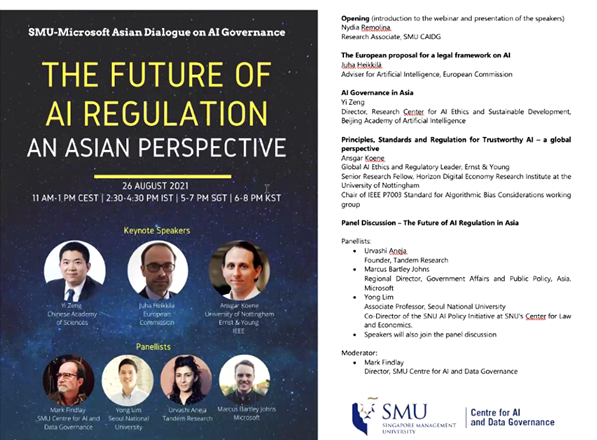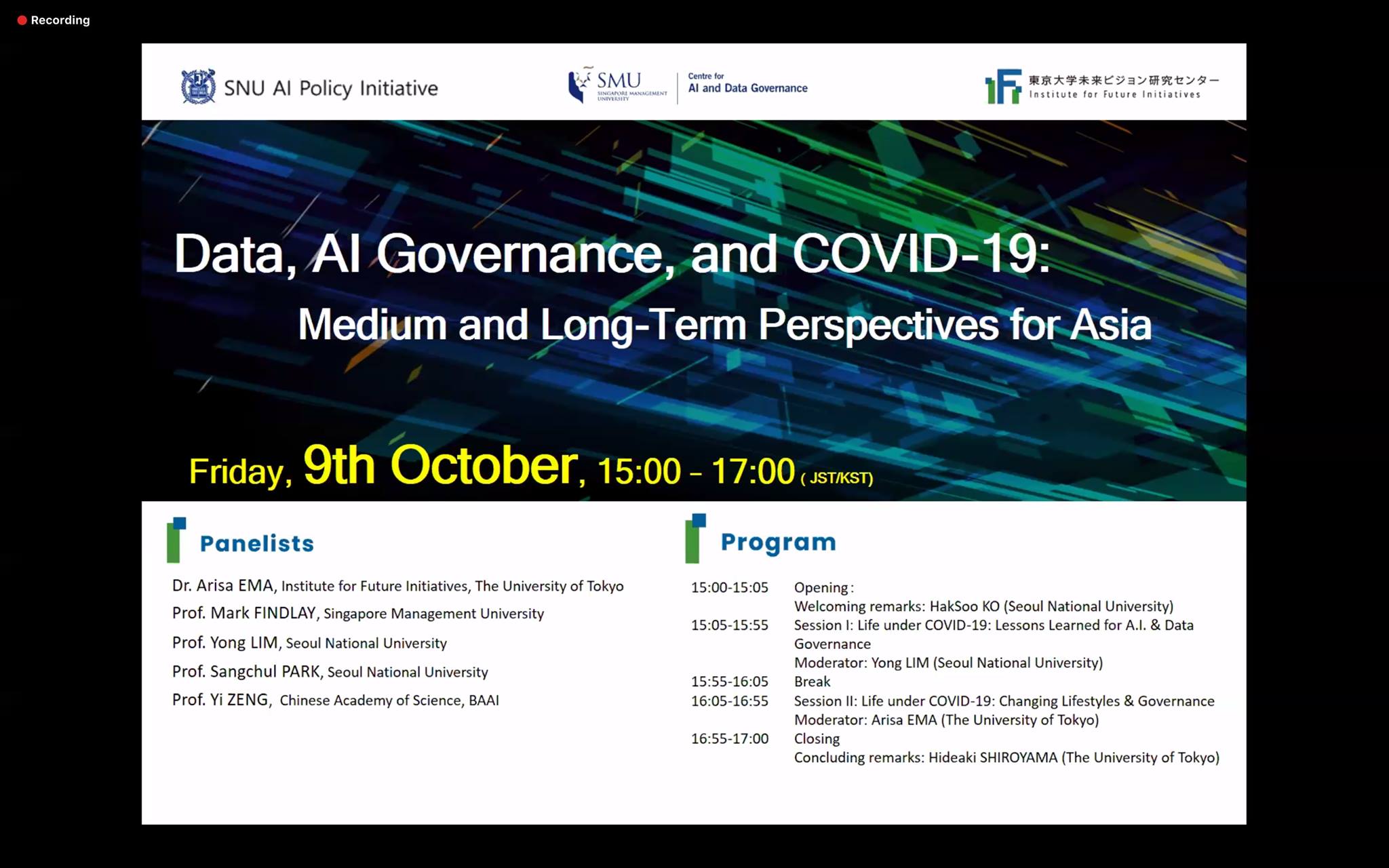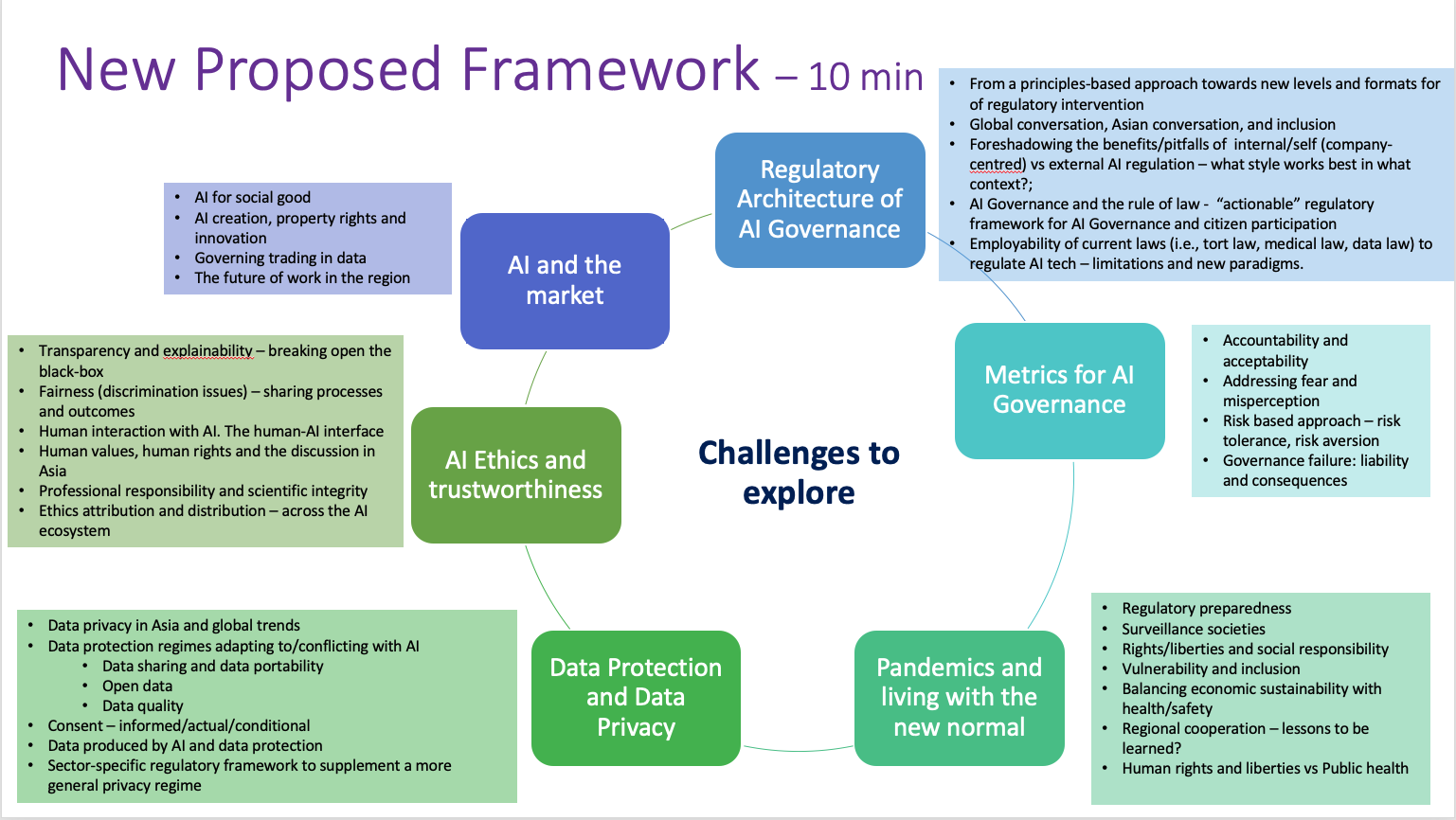[Webinar] "The Future of AI Regulation: An Asian Perspective" - 26 August 2021

As part of the Asian Dialogues, SMU is hosting a series of webinars to discuss some of the pressing issues in the field. This first session is about the Future of AI Regulation. New policy initiatives concerning the governance of data and AI signal the rise of new oversight in many jurisdictions. On 21 April 2021, the European Union announced draft legislation to harmonise its member states’ AI rules. Countries in Asia have adopted a different approach to AI ethics and governance. Is AI regulation the solution to AI governance challenges? In this webinar, experts with different perspectives on the matter will discuss the future of AI regulation and its implications for Asia.
The first presentation was given by Juha Heikkila who spoke about Europe’s digital future and the EU’s draft legislation on AI. This set the comparative background for today’s discussion on what the future holds for AI regulation in Asia and whether Asia is to diverge from the European Strategy or whether it will follow suit. Yi Zeng’s topic and recommendation for “deep coordination of sustainable development and governance” was choiced to engage with this debate. He offered our participants an insight into how AI governance is viewed by scholars in Asia and explored both Western-centric and Asia-centric approaches. At the end, he acknowledged how AI governance in Asia is still shaped and influenced by trends in the West. This smoothly transitioned into Ansgar Koene ‘s topic on standardization and AI policy development. Ansgar’s presentation provided a timely and relatable platform for our panel members to discuss whether it is possible to standardize or harmonize AI principles in Asia. This led our panel to explore other “informal” approaches to AI governance in Asia, opening the debate on whether ethics operate as a sufficient framework to address AI governance issues and an exploration of other best-approaches.
[Webinar] "Data, AI Governance, and COVID-19: Medium and Long-Term Perspectives for Asia" co-organised with Seoul National University AI Policy Initiative and University of Tokyo Institute for Future Initiatives - 9 October 2020

On 9 October 2020, the Center organized and co-hosted a webinar with the AI Policy Initiative (Seoul National University), and the Institute for Future Initiatives (The University of Tokyo) on the topic of “Data, AI Governance, and COVID-19: Medium and Long-Term Perspectives for Asia”. The webinar built on contributions from an earlier joint report published in September 2020 that mapped out China, South Korea, Singapore, and Japan responses to COVID-19 and its potential challenges from an AI, data governance and human rights perspective (https://ifi.u-tokyo.ac.jp/…/uploa…/2020/09/report_200916.pdf).
The webinar started with Prof HakSoo Ko (Co-director, SNU AI Policy Initiative) giving the opening address. This was followed by the session 1 "Lessons learned for AI and Data Governance" moderated by Prof Yong Lim (SNU), panelists included our centre director Prof Mark Findlay, Prof Arisa Ema (University of Tokyo), and Prof Yi Zeng (Chinese Academy of Science, BAAI). The second session on "Changing Lifestyles & Governance" was moderated by Prof Arisa Ema, and Prof Sangchul Park joined the panel. The webinar concluded with Prof Hideaki Shiroyama (Vice Director, Tokyo University Institute for Future Initiatives) delivering the closing remarks.
The panelists shared with participants their further reflections on the employment of these COVID measures, and what this emerging trend of technology and big databases signal for the future of AI governance and ethics. They covered a broad range of topics in the two sessions and weighed in on topical issues concerning #DataPrivacy, #StateSurveillence, #ContactTracingApplications, and #GoodGovernance. Panel members also engaged in a lively discussion on the durability of these COVID measures and highlighted several factors that may run counter to their effective termination in the foreseeable future.
We thank all the panel members and audience for the meaningful dialogue session.
Internal Meeting - 1 October 2020

New Proposed Framework and style
We have reached a consensus on the new proposed framework.
- Participants will select from the available themes and work on their topic(s) of interest. To clarify, participants do not have to restrict themselves to any one particular theme but can also collaborate/research into other areas with our fellow research partners.
- The new framework has been designed in a way that that not only enables but encourages participants to work on areas that are both broad and specific in nature. Put differently, participants remain free to work on narrow topics of their interest so long as it fits into one of the general themes.
- Some interesting suggestions on our “dialogue methodology” and how to raise our reputation were put forward in our conversation today. We highly encourage participants to pursue these avenues amongst themselves, with our institution, and other interested stakeholders. CAIDG will perform any necessary coordination/administrative work in this respect including:
- Organizing work-in-progress meetings with fellow dialogue participants to discuss research papers
- Connecting with others in your jurisdiction to integrate them into our Asian dialogue on AI governance
- Setting up one to one meetings with individual participants whose research interest(s) are aligned with yours
- Using the new dialogue microsite to disseminate your work or to publish work in progress meetings for comments
Outputs for 2020/2021
- As discussed, we can be flexible with our deliverables/outputs – bearing in mind also the preference for broader dissemination to a wider audience.
- Work in progress workshops
- Paper lectures
- Case studies (Arisa and SMU might present something by the end of 2020)
- Expert talks
- Collaborations for research
- We can also seek to combine a variety of different outputs as a collective whole such as for a special issue or an e-book.
Next steps
- At your earliest convenience, please indicate to us your preferred theme(s) and output(s). After receiving your responses, we will get back to you with a proposed timeline for 2020 and 2021 based on everyone’s ideas.
- CAIDG remains at your disposal to carry out any administrative duties required to see to the fulfillment of our discussed objectives.
- We look forward to seeing you again for the external webinar on the 9 October and thank you for your participation today.
Last updated on 01 Apr 2024 .